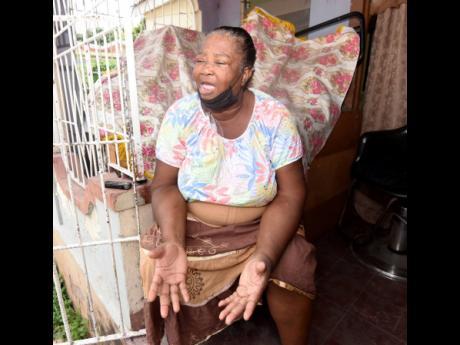Dialysis dilemma
Jamaicans with kidney failure face uphill battle with treatment costs
Shortness of breath and yellowing hands were warning signs for Carmeta Clarke that all was not well.
She was hit in September 2020 by a shock diagnosis of renal failure. Then the drudgery of dialysis. Then the thousands of dollars in bills started to take a toll.
“Dying would have been better. It would have been better,” the 60-year-old said on Monday, tears streaming down her face.
Clarke missed her treatment last Saturday because she could not find the $10,200 she is charged for each round of dialysis. She recounted that the last time she missed the treatment, in May, she slumped into a four-day coma.
“When I woke up the Thursday, I was getting oxygen and everything and the doctor said to me, ‘Please try not to miss any more treatments,’” Clarke told The Gleaner.
Her weekly ordeal of mustering enough funds for dialysis – the removal of toxins from the blood when the kidneys malfunction – is a personal battle waged by hundreds of Jamaican outpatients.
Clarke is scheduled to undergo dialysis on Wednesdays and Saturdays, twice per week as required. That leaves her needing $81,600 per month, excluding transportation to the Diabetes Association of Jamaica and groceries for her dietary needs.
The eastern St Andrew resident, who is hypertensive, told The Gleaner that she goes days eating ackee, sausages, and rice at her Rollington Town home.
“When him see tears come and him say him nuh have nothing fi give me, tears drop out o’ him eye,” the mother of four said of her 23-year-old son, who visited her last Saturday.
Clarke, who formerly worked in the upholstery industry, said that virtually all her money – much of it gifted by family – is spent on medical treatment.
“Sometimes when I go on the machine to do dialysis, I am hungry,” she whispered.
PUNISHING PAYMENTS
Chairperson of the Diabetes Association of Jamaica, Lurline Less, is aware of how punishing dialysis payments can be. She has noticed “a dramatic shift” in the dialysis demographic over the last five to six years.
There are currently 74 renal patients, all of whom are hypertensive, on roll at the Diabetes Association’s clinics. Seven of them are between the ages of 25 and 49.
“A lot of them are young men, breadwinners,” Less told The Gleaner on Monday.
The Diabetes Association of Jamaica has been operating its kidney dialysis centre for 18 years.
Less is appealing for more public education on the link between non-communicable diseases and renal failure.
“While we look at insurance, it’s not sustainable. We need a broader prevention strategy to preserve life,” she said.
Everton Anderson, chief executive officer of the National Health Fund, said that the state-run organisation does not cover treatment for chronic kidney disease as a condition.
“Patients with renal failure who have other comorbidities benefit from medication on the programme for other illnesses,’’ Anderson said.
Drug Serv pharmacies provide all major drugs, free of cost, to manage renal failure.
A nephrologist, who requested anonymity, said that grants and sponsorships are offered by the Government and entities such as the CHASE Fund to provide financial assistance for treatments.
“Another thing is when you get the grants, some of the units are unwilling to take it because the Government takes forever to pay,” the nephrologist said.
The 2018 data from the Jamaica arm of the Caribbean Renal Registry state that there are more than 2,700 chronic kidney disease patients living in four major parishes of Jamaica, with more than 800 receiving dialysis and 1,200 expected to need renal replacement therapy.
In 2010, the World Health Organization estimated 2.3 to 7.1 million deaths of people with end-stage kidney disease who had no access to chronic dialysis.
Persons willing to help Carmeta Clarke may contact her at 876-422-1059.

